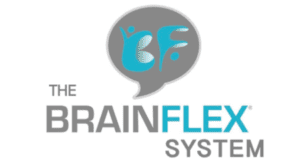Exercise and Nutrition are Vital to Brain Health and Aging Well
 Submitted by Melissa Arnold, CDP
Submitted by Melissa Arnold, CDP
The BrainFlex System
What can we do to age well and keep our brains healthy?
The answer is in our lifestyle choices. The following activities have been confirmed, through countless research studies, to contribute to healthy aging and to slow down cognitive decline:
- Exercise
- Nutrition
- Socialization
- Brain Stimulating Activities
- Healthy Sleep Patterns
- Prayer/Mediation while focused on truth, faith, hope, forgiveness, love, etc.
Although each of these important components are necessary to ‘age well’, for this article, let’s focus on the first two, Exercise and Nutrition.
Exercise
Exercise boosts the number of dendrites in the neuron.
Dendrites receive messages from other neurons and the more dendrites a nerve cell has, the more connections it can make. These connections are necessary for problem solving, recalling, decision making and more.
Exercise is a mood booster.
It produces dopamine; a ‘feel good’ neurotransmitter, which improves our state of mind. Research studies focusing on the mental benefits of regular exercise reveal that exercise can provide benefits similar to those found in anti-depressants, without the long list of dangerous side effects. (Consult your doctor before discontinuing any type of antidepressant and/or anti-anxiety medications.)
Since depression is now considered to be one of the contributing factors to cognitive decline, our state of mind is another important area in which to be proactive. (Vaillant, 2003)
Exercise decreases cortisol levels.
Cortisol is a stress hormone, which is helpful in dangerous or stressful situations. In this case, the cortisol is released in the moment it’s needed and can increase our focus and clarity of mind.
However, ongoing stress, worry, and anxiety can cause this hormone to be released in a ‘slow drip’, which is very detrimental to the body and can contribute to brain cell damage. (Vaillant, 2003)
Exercise boosts the immune system.
According to many researchers, exercising as little as 20 minutes a day can have significant anti-inflammatory effects. Battling inflammation in the body benefits the immune system and helps the body battle against viruses and other diseases.
Exercising at least 3 hours per week can increase the volume of the brain and also increase BDNF’, in the brain, (Brain-Derived Neurotrophic Factor). This is a protein that assists the brain in the cognitive (thinking) process.
Exercise benefits the hippocampal circuits
This is an area of the brain shown to deteriorate at a faster rate than others, especially as we age. In several studies, exercise consistently sparked neurogenesis, (the growth of new brain cells), in this area of the brain. (Nusslock, 2018)
According to Carmen Terzic, MD, PhD, from the Mayo Clinic in Rochester, Minnesota, moderate exercise helps control hypertension, diabetes, reduces anxiety and stress, slows the aging process, and contributes to the prevention of disease, including those impacting brain function.
The Center for Disease Control and Prevention has also stated that physical activity can extend a person’s life expectancy an additional 10 years!
Many scientists now agree that if the benefits of exercise came in the form of a pill, it would be one of the greatest breakthroughs in the history of medicine and could potentially prevent a large percentage of the diseases we face today!
Nutrition
The Mediterranean Diet is considered by many research scientists to include “neuro-protective” foods. These foods have been shown to contribute to the prevention of Alzheimer’s and other types of dementias, as well as many of the diseases that contribute to Alzheimer’s, such as type 2 diabetes and cardiovascular disease. (Buettner, 2009) (Brain Games, 2019)
Here’s a few examples of brain healthy foods:
- Salmon is considered to be one of the best fish for the brain. However, there are other types of healthy fish that provide nutritional value to the body and brain. (Avoid fish high in mercury.)
- Avocados
- Vegetables that are dark green like spinach, kale, and broccoli
- Tomatoes
- Fruits low in sugar, such as berries (blueberries, raspberries, blackberries)
- Healthy fats (olive oil, coconut oil, flaxseed)
- Nuts
- Water
Note: Foods should be purchased as organic whenever possible.
For decades, we have been aware of the impact that food has on our health. Research now confirms that a diet high in sugar, saturated fat (the bad fats) and simple carbohydrates leads to a break down in the body, which often includes (but is not limited to), brain fog and an increase in aches and pains in the joints and muscles.
The following are a few of the many factors that are believed to contribute to the development of disease, including those that cause dementia. In most cases, we can prevent these diseases by our choices.
- Diabetes
- Stroke
- High Cholesterol
- High Blood Pressure/Hypertension
- Cardiovascular Disease
- Depression (Isolation being largest contributing factor)
- Alcoholism
- Obesity
Numerous studies have shown that what we eat directly affects the brain. It’s now understood that the right nutrition has a major impact on brain health and can deter and/or slow down cognitive decline
The stomach is now considered to be the “second brain.” There is a direct connection between the stomach and the brain. Dr. Caroline Leaf, a Cognitive Neuroscientist, has confirmed through over 30 years of research, what many other studies have also revealed, which is “what we put in our stomach directly impacts the brain”…(and mind.)
In addition, research reveals that 95% of our serotonin is produced in the stomach as well as much of our dopamine. This means that if we aren’t eating properly, our mood and mind are negatively affected, as is our sleep.
Here’s a list of foods that have been shown to cause damage to the brain and the body. (Brain cells, neural pathways, synapsis, etc., as well as our organs and digestive system.)
Number one on the list… Sugar!
Processed foods that are high in sugar, such as cookies and sweet cereals. Sugary drinks, such as all colas, sweet tea, almost all types of juice box drinks, lemonade, and many types of juices. (Be sure to check labels.)
Refined Carbs
These foods consist primarily of sugars and processed grains. Foods found on the shelf that include white flour, white bread, white rice, pastries, sodas, snacks, pasta, sweets, and breakfast cereals with added sugars.
Almost all processed foods fall under the category of “refined carbs” and will create inflammation in the body.
Foods High in Trans Fats
Trans fats are a type of unsaturated fat that can have a detrimental effect on brain health and create a type of “sludge” throughout the body. These include;
- Crackers, cakes, frozen pies, donuts
- Fast food
- Vegetable shortenings
- Coffee creamer
- Refrigerated dough products such as biscuits and cinnamon rolls
Highly Processed Foods
Processed foods are those that has been frozen, packaged, cooked, canned, or basically preserved. Any time food is cooked, it’s going through a process. For example:
- Most breakfast cereals
- Processed cheeses
- Canned vegetables
- Bread (If bread is a must, sour dough bread and sprouted whole grain bread is the better choice.)
- Pies, pastries, cakes, and biscuits
- Meat products, such as bacon, sausage, ham, salami, sausage rolls. Deli meat should not be processed and should be “nitrate free.”
Drinks and Food Containing Aspartame
This is included in all diet drinks, and in many “light” drinks. Many researchers now associate sugar substitutes containing aspartame as “toxic.” Currently, Stevia is the best alternative to sugar, if you must have sugar.
Honey and pure maple syrup are also alternatives, however even these substitutes will impact your glucose levels and may cause you to gain weight.
Works Cited
What Happens to the Brain in Alzheimers’ Disease. (2019, May 4). Retrieved from National Institute on Aging: https://www.nia.nih.gov/health/what-happens-brain-alzheimers-disease
Nusslock, P. Z. (2018, February 7). Exercise-Mediated Neurogenesis in the Hippocampus via BDNF. Retrieved from Frontiersin.org: https://www.frontiersin.org/articles/10.3389/fnins.2018.00052/full
Vaillant, D. G. (2003). Aging Well. Boston: Little Brown & Company.
Leaf, D. C. (2018). Think, Learn, Succeed. Ada: Baker Books.
Maggie Moon, M. R. (2016). The Mind Diet. Ulysses Press.
Markus MacGill, R. b. (2018, February 13). What’s to know about Alzheimer’s Disease. Retrieved from Medical News Today: https://www.medicalnewstoday.com/articles/159442.php
Michelon, A. F. (2013). The SharpBrains Guide to Brain Fitness. SharpBrains Inc.
Nutrients, Healthy Brain Aging, and Dementia Management. (2019, May 22). Retrieved from Frontiers IN: https://www.frontiersin.org/research-topics/7518/nutrients-healthy-brain-aging-anddementia-management

Melissa Arnold, CDP
The BrainFlex System
Melissa Arnold is the founder and creator of the BrainFlex System, a series of workbooks that encourage brain health, social engagement, and more.
